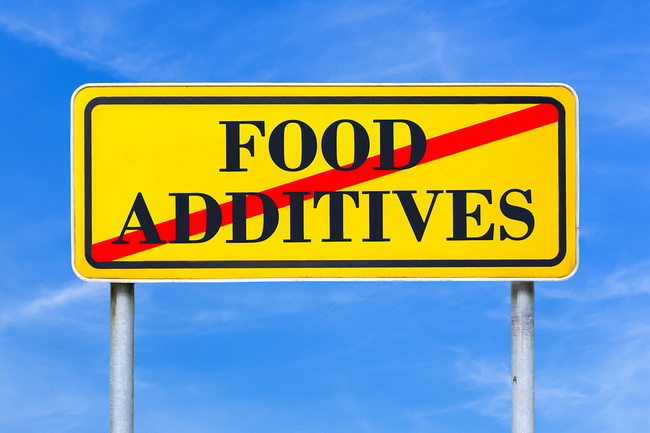- Make It Yourself Lavender Heart-Shaped Bath Bombs!
- 20 Things You Never Knew About “Down There”
- 12 Best Foods For Those Suffering From Arthritis Pain
- 12 Personal Hygiene Mistakes Almost Everyone Makes (Mom Never Told You About #4!)
- 15 Medicinal Plants And Herbs From The Cherokee People
- 12 Mind-Blowing Benefits Of Drinking Coconut Water During Pregnancy
- 12 Outstanding Winter Foods That Won’t Fatten You Up Like A Christmas Turkey
Are the Ingredients in Your Food Stealing from Your Body?

Photo credit: bigstock.com
Unless you are living on your own farm and are completely self-sufficient, there’s a pretty good chance that you are eating at least some pre-packaged foods. Big Food manufacturers are always pushing their research scientists to find way to make their foods cheaper for them, even if it means not healthier for you. Big Food doesn’t give a hoot about you or your health; they only want you to keep buying their product and to find ways to make more money doing it.
For many of us, even when we are eating what we think is a fairly well-balanced diet, we are probably eating some of these packaged foods, such as cereal, yogurt, and frozen whatever. Unfortunately, this also means that we are probably nutrient deficient in some way, even when we consume supplements to try to make up for it. On average, Americans are over-fed, but under-nourished. Sad, but true.
How does this happen? Believe it or not, it’s because of some of the ingredients that are found in those packaged foods. They literally steal nutrients from your body. So you can consume those nice, fresh, organic veggies, and then lose most of the nutrients by having that soda to drink.
When you remove those nutrient thieves from your diet, your body can actually receive the nutrients that you eating. Keep reading and find out who these thieves are, so you can remove them from your foods.
1. Distilled Water
This is commonly found in carbonated drinks and even in some juices, but disturbingly, more and more people are drinking distilled water believing that it is the only true “pure” water around. It’s true that distilled water will remove all the impurities that are found in water, but it also removes vital nutrition’s and trace minerals that are absolutely vital to the body. Distilled water causes an electrolyte imbalance in the body. Your body will attempt to make up for those missing electrolytes by pulling them from your tissues.
Eventually, however, your body will have no more electrolytes to pull from which will result in weakness, headaches, fatigue, muscle cramps, and an abnormal heart rate. By the way, distilled water is so acidic that it can become a major health problem because the pH of distilled water is not naturally found in nature. Long term consumption of distilled water can cause mineral loss which will greatly increase your risk of hypothyroidism, osteoporosis, osteoarthritis, high blood pressure, and coronary artery disease.
2. Soy
Soy, sometimes listed as soy lecithin, hydrolyzed plant protein, protein isolate, textured vegetable protein, or even vegetable broth, is found in literally hundreds of packaged foods, including soy milk, nutrition supplements, baked goods, soups, pasta, and salad dressings to name a few. In short, soy robs your body of important enzymes and iron. This once healthy plant has now become a serious source of toxicity, especially over the past 30 years or so.
In case you weren’t aware of it, about 99 percent of the soy grown and used in food products is a GMO. Even soy labeled as non-GMO or organic has been exposed to the same problems as GMO soy, too many pesticides and too many chemically based fertilizers. Only wheat causes humans more health problems than soy. Due to nutrient depletion from consuming soy, you can expect numerous health problems including thyroid hormone depletion, allergies, growth issues, infertility, and even certain types of cancer.
Continue to Page 2

Photo credit: bigstock.com
3. Disodium EDTA
Sometimes listed as ethylenediaminetetraacetic acid, this preservative steals numerous nutrients from your body including magnesium, iron, potassium, zinc, calcium, and vitamin C. This chemical is used to preserve the flavor and coloring of foods. Your doctor will also prescribe this for those who have been poisoned by heavy metals. Although this might sound like a good thing, getting heavy metals out of your body, unfortunately, it also clings to minerals that your body needs. It binds to minerals in your intestine, then disposes of them through your stools.
Chemical preservatives such as disodium EDTA don’t know the difference between good minerals and bad minerals; it simply removes all of them. Mineral depletion in the body can lead to a weaker immune system, kidney damage, anemia, digestive problems, and compromised nerve function.
4. Guar Gum
Don’t confuse this with chewing gum; guar gum is actually fiber from guar beans, which thicken foods such as cottage cheese, soups, some beverages, and frozen desserts. This fiber feeds your gut bacteria, causing an overproduction, which makes your body and these bacteria compete for nutrients.
The Technical University of Munich states that consuming guar gum can reduce the absorption of carotenoids by as much as 22 percent. Carotenoids are vital to many organs, especially to the eyes and a lack of this nutrient can lead to serious eye diseases, including macular degeneration.
Continue to Page 3

Photo credit: bigstock.com
5. Canola Oil
This oil is found in hundreds of processed foods and is sometimes listed as vegetable oil or rapeseed oil. Canola oil will steal antioxidants and vitamin E from the foods you eat. By cross-breeding multiple types of rapeseed plants in the 1970’s, Big Food was able to produce an odorless oil they renamed as Canola. In 1995, Monsanto created a GMO version of this oil. Don’t be fooled by labels claiming that canola oil is “organic;” it is a 100 percent GMO product.
Although they might have grown these plants without pesticides, but they are still 100 percent GMO. Canola oil causes inflammation in the body, which is the base cause of many diseases including OCD, Parkinson’s disease, schizophrenia, and arthritis. Long term consumption of canola oil has been linked with the development of heart lesions, lung cancer, anemia, prostate cancer, and CNS degenerative disorder.
6. Processed Sugar
Sugar goes by so many names, it’s difficult to list them all, but they include malt syrup, raw sugar, sucrose, glucose, fruit juice concentrate, evaporated cane juice, crystalline fructose, dextrose, lactose, and maltose, just to name a few. Sugar is found in almost everything, including ketchup, salad dressing, sodas, frozen fruits and vegetables with sauces or marinades, soup, and the usual cakes and candy. Sugar steals calcium, magnesium, and vitamin C from the body, while feeding cancer cells.
Sugar and vitamin C use the same pathways to enter cells, so they are in a sort of competition with each other. The body naturally absorbs only a limited amount of fructose. When we consume more than a small amount, the intestines reject it, and this sugar ends up feeding gut bacteria, leading to overgrowth. This overgrowth of bacteria feeds on the nutrients that are meant for our body. This can lead to weak bones, insomnia, chronic inflammation, and a weakened immune system.
Continue to Page 4

Photo credit: higherperspective.com
7. High Fructose Corn Syrup
Although this ingredient could be included with sugar, since it is a sweetener, but it is so damaging that we decided to list it separately. HFCS is sometimes referred to as corn sugar, corn syrup, or corn sweetener, and you will find it in almost as many places as you will sugar: sodas, yogurt, fruit juice, cereal, cookies, cakes, condiments, and most packaged foods. HFCS steals zinc, magnesium, and chromium from the body. In 2011, the USDA says that the average American consumed about 131 calories of HFCS every single day.
This sweeter has about the same effect on the body as sugar, including the overgrowth of bacteria that robs the body of nutrients. Unlike sugar, however, this sweetener doesn’t trigger the “I’m full” signal, leptin, in the brain, which makes overeating much easier. HFCS can lead to hair loss, elevated triglyceride levels, diarrhea, obesity, and an impaired immune function.
8. Added Pectin
You have probably heard that pectin is a good source of fiber, and that is true, but not when it has been added to certain foods. Pectin is often added in milk drinks, yogurt, jam, jelly, and fruit juice.
Added pectin will rob your body of lutein, lycopene, and beta-carotene. Although pectin does move through the body like fiber, it also is something like glue, sticking to things as it travels. Apples and other natural foods that contain pectin are fine, but the added amounts of pectin in processed foods is excessive and it pulls important nutrients such as lycopene and other important cancer fighting antioxidants with it.
Continue to Page 5

Photo credit: bigstock.com
9. Phosphoric Acid
This is added to almost every carbonated beverage to keep it from going flat. Unfortunately, phosphoric acid is a real double whammy to the body, blocking the absorption of magnesium and calcium, which causes your body to dip into your bones. Phosphorus and calcium are like BFF’s, as they like to be together all the time.
This means that when you consume phosphorus without calcium, it teams up with whatever calcium it can find in the body and because calcium is always holding hands with magnesium, you will lose both minerals by simply introducing phosphorus to the party. The loss of these vital minerals means poor dental health, weak bones, cramps, osteoporosis, increased food cravings, and muscle spasms.
SEE ALSO: The Frightful 15: Food Additives That are Killing You
10. Synthetic Sulfites
Sometimes listed as sulfur dioxide, sodium disulfite, sodium sulfite, or calcium sulfite, this chemical is found most often in wine, beer, shrimp, potato products, and white rice. Sulfites steal vitamin B1 from the body. Sulfites are used to keep drinks and foods from turning brown or losing their natural color.
Synthetic sulfites steal thiamine (vitamin B1), which is vital towards keeping your heart healthy and your mind clear. A severe deficiency in this vitamin can lead to beriberi disease, a condition common among alcoholics. Synthetic sulfites can even cause life-threatening food allergies in some people. Synthetic sulfites can cause cataracts, lethargy, and, in extreme cases, beriberi disease, as we mentioned earlier.
There are more ingredients that rob nutrients from your body, but since all of these are found in packaged or processed foods, you can avoid all of them by simply eating a more natural diet in the form of organic fruits and vegetables, raw seeds and nuts, and coconut oil. If a food you would like to buy has more than 5 ingredients on the label, put it back and make another choice.
References:
































